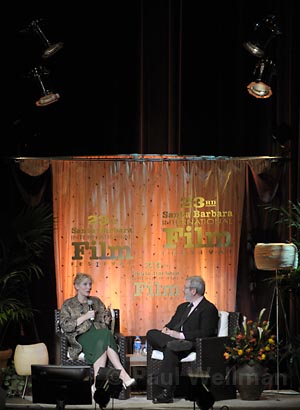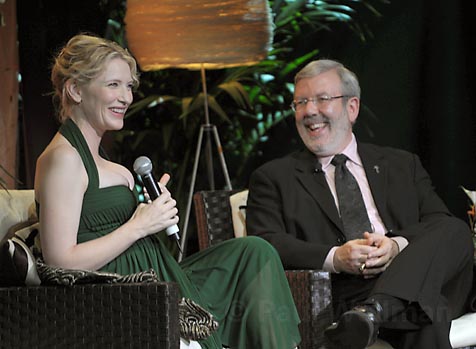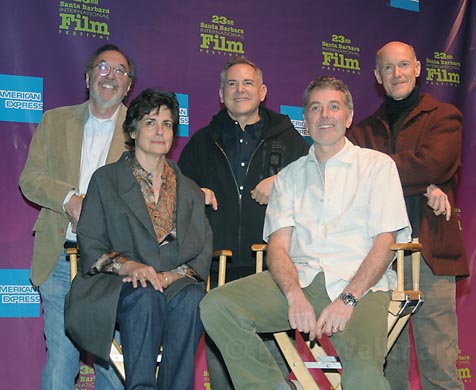On the Wings of Film
On The Beat: Barney soars through Film Fest first weekend

The World Flew In: The outside world has rushed into little Santa Barbara on wings of film, bringing fantasy, screen goddesses, and jarring documentaries.
The rest of the year we’re cozy, so close to mountains and sea, so far from whatever’s going on out there. But every year at about this time, the Santa Barbara International Film Festival bursts in with movie stars, producers, directors, writers (well, they didn’t show up), rude L.A. paparazzi, parties, and schmoozing, along with brilliant films we may or may not ever hear of again, sobering, gritty documentaries, and eager young filmmakers begging for a bit of the spotlight.
We matter, at least for 11 days. It’s exciting and also surprising that some locals pay little or no attention to why there are lines in the rain outside downtown theaters.
After all, 20 Oscar nominees are in town (it doesn’t hurt the Festival that it’s held only weeks before the Academy Awards) and that the likes of Julie Christie and Cate Blanchett flew in from Wales and Australia, respectively.

Both, under the too-gentle probing of Leonard Maltin’s questioning on stage at the Arlington, downplayed any early interest in movie careerdom and seemed surprised and faintly amused that they’d become stars. (For those under 40, Christie won fame in 1960s Darling and Doctor Zhivago.)
But in the clips of their films, both showed great passion and versatility, qualities that don’t spring from snoozing in the trailer while waiting to be called before the camera.
Blanchett, wearing a long, low-cut green gown on stage, revealing her advanced state of pregnancy, mentioned her growing family she had two small children as well — may slow down the furious pace of her many screen roles. As for appearing on the big screen, Blanchett noted while receiving the Festival’s Modern Master Award Saturday night, “There is a myth and actors are exhibitionists.” It took her “a long time” to be comfortable with being watched. As for researching her role as Katherine Hepburn in The Aviator with Leonardo DiCaprio playing Howard Hughes, she watched some of Hepburn’s early screwball comedies. “I can’t imagine them having sex,” she said, reflecting on the real-life romance of Hepburn and Howard Hughes, certainly one of Hollywood’s least likely couples,
People still come up to her praising her role in Titanic , when it was actually Kate Winslet. Most recent role: Indiana Jones. In it, “I’m a baddie.”
Introducing Christie, Festival honcho Roger Durling — blonde for this year’s event — told the Arlington audience, “I’m pretty flabbergasted that we have here the amazing Julie Christie.”
Christie said she normally doesn’t watch her films. “Usually, I’m cringing.” And it takes a lot to lure her from her farm in Wales. Recalling filmmaking years ago with director John Schlesinger, “He was very rude to me and I was very rude to him.” In one scene, as she was in her bra and panties setting up a scene, they had a screaming match, resulting in her tossing her bra at him, “hitting him in the face,” she said.
Her breakthrough role in Darling was originally offered to Shirley MacLaine. Making Petulia with director Richard Lester, “I never understood a word he was saying.” As the years passed, she has made fewer and fewer films, although this year is nominated for a best actress Oscar in Away From Her. “I’m not career minded or ambitious.” Although pleased at the Oscar nomination, she’s turned off by the hoopla.
The Producers: But if the movie-making process has a tendency to “infantize” actors (as Blanchett put it) who often don’t make the major decisions, then who does? Well, the producers, among others.

(The question lingers among those outside the movie business: What do they do? Well, according to producers at Saturday’s panel at the Lobero, they hold the whole thing together and have key conversations with the directors long before shooting starts.
Santa Barbaran Jason Reitman, chosen to direct the smash hit and Oscar best picture nominee Juno, although a young man with only one feature under his belt, was “mature beyond his years and well-trained,” producer Lianne Halfon told the audience. Jason’s father is long time producer and Santa Barbaran, Ivan Reitman ( Ghostbusters, Eurotrip, Disturbia).
Craig Zadan, co-producer of Hairspray, said it took 14 months for John Travolta to decide he could handle playing the part of a woman. And co-producer Neil Meron added, they were not making the movie until Travolta was in it.
So how do you handle strong-minded actors like Jack Nicholson, in an effort to keep problems from erupting on the set? Very carefully: and by going over the script with him long before shooting and each day before the cameras roll, one producer said.
Juno was shot for $6 or $7 million but the original budget was twice that, so the movie makers had to “back into” what the studio was willing to pay by doing a lot of pre-production work and starting editing before the final shoot, among other things, Halfon said. At last report, Juno has grossed over $100 million, a word-of-mouth surprise with no marquee star names.
As a result “We’re getting a lot of pregnancy scripts,” Halfon cracked. Producing a movie, she said, was something like giving birth: “You forget the pain” after the child is born.
Then there are the test screenings, where producers get vital feedback from audiences. On The Simpsons Movie, they’d take a bus to screen-test theaters “and do rewrites on the bus going home,” James Brooks said. Zadan told of one film where the producer was stubbornly refusing to allow a key ending scene. At a test, scores showed that “the air went out of the balloon” due to the end. “We begged them for extra money” to film the final five minutes. After that, “The scores went through the roof.”
Near the end of the panel discussion, the gloomy topic of the current Hollywood writers’ strike came up, with warnings that it could bring major changes to TV. According to a report cited by one producer, “reality” shows that are subbing for scripted shows have been getting higher ratings at less cost. (Is this TV’s future?) “I’m worried because if the freak shows take over, we’re in trouble.”



